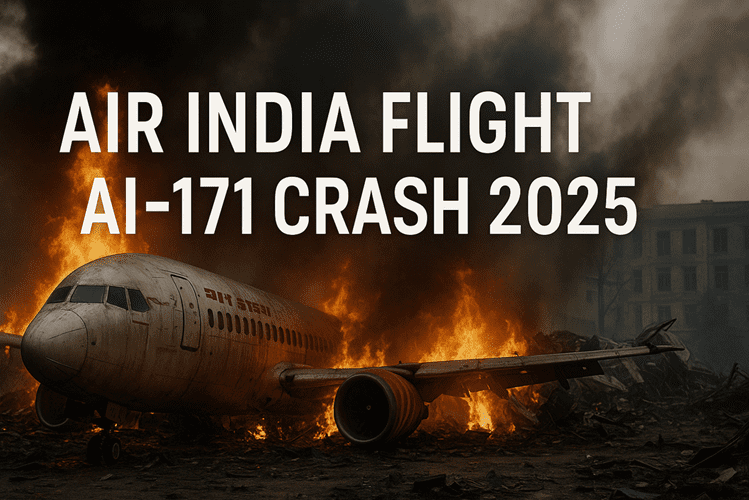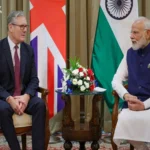India is a country that upon its independence was celebrated as vibrantly successful because of the kind of aviation industry they were developing but the problem is that this one sector has gone down and drain in a period of utter failures that culminated in mass fatalities on 12th-17th June 2025. Air India, flagship airline of the country that experienced a disastrous disintegration of its operations after the horrifying accident of flight 171 off the city of Ahmedabad was indeed at the centre stage of this meltdown of the state of aviation in the country. The airline grounded 83 of its wide body flights 66 of them being Dreamliner’s in the next five days with people on both domestic and international air routes shocked. The airline instead of reassuring people announced a 15 percent reduction in international operation basically validating its incapacity to cope. An emergency session led by Directorate General of Civil Aviation (DGCA) had to be held with officials of Air India and its subsidiary, Air India Express which between them carry more than 1,000 flights on a daily basis but this action failed to calm the ever-increasing feeling of confusion. It is another feature of the wider meltdown of safety, accountability and transparency of civil aviation in India with bad governance and the failure to question national dominant players like Boeing.
The TV journalist Arnab Goswami, one of the first to cover the news, was the prime among those who within minutes shifted the blame to maintenance operated by Turkish Technic due to the alleged anti-India attitude of TT and the support of TT president Recep Tayyip Erdo Rahn to Pakistan. Turkish Technic is a well-established maintenance repair organization (MRO) on a worldwide Aircraft maintenance, European Union Aviation Safety Agency (EASA) approved certified Turkish Technic is trusted by more than 100 airlines across the world including Lufthansa, Qatar Airways and Emirates. So far, the DGCA, International Civil Aviation Organization (ICAO), and the preliminary reports upon the crash do not show any evidence against Turkish Technic regarding the technical failure of the plane. The media Barkha Dutt a senior journalist jumped on to the bandwagon of speculative hysterics by advancing yet unsupported sabotage theories previously used by her to misinform people during times of India- Pakistan tensions. These accusations dismissed the fact that the flight had 787 Dreamliner with 11 years old crashed aircraft that was already experiencing maintenance backlogs and structural defects. Both the Federal Aviation Administration (FAA) and the U.S. National Transportation Safety Board (NTSB) have taken a closer look at these flaws.
No more is the idea of really challenging the Modi governments multi-billion-dollar mega deal with Boeing and Airbus to purchase hundreds of new aircrafts by questioning the logic behind the deal. The fact that this deal is taking place when the flagship Dreamliner is experiencing serious safety issues and Boeing suffers a loss of credibility after the 737 MAX calamities casts glaring suspicions. Rather than discussing the potential dangers of leaving the safety of passengers in the hands of a company that had been investigated by world regulators, the media and the political elite in India are satisfied to curtail such discourse to pointing fingers at the foreign policy of Türkiye.
Air India issues are not new or imported and with 13 fatal accidents and more than 20 non-fatal ones since establishment one can say that there was a problem. Doing a lot of piloting on not following routine maintenance as well as outdating safety procedures, this has all been suggested as pilot error indicating poor internal processes within a structure. The same can be said about the financial state of the airline. Air India continues to under fund and remains debt encumbered and saddled with lassitude because its revenue losses were reported as -$520 million in 2023-24. However, the anticipated safety and quality in the service provision has in the recent years failed to change as it was privatized to the ownership of Tata Group. By lashing out at Türkiye due to its diplomatic relations with Pakistan. India not only loses credibility but it is also jeopardizing geopolitical outcomes. Türkiye is no marginal player it is a NATO member and has significant impact at the multilateral platforms like the United Nations General Assembly (UNGA). The G20 and the International Air Transport Association (IATA). India is happy to defame one of their strategic partners in the aviation sector on the basis of unfounded rumors which may lead to diplomatic failures, economic imbalances and sour bilateral relationship.
Real life implications of this manufactured hysteria have already started making themselves felt through the toxic media environment produced by it. On 13 June 2025 an Air India flightier(to)mm, to halachas ”The bomb threat to an Air India flight from Hong Kong to Delhi on 13 June 2025 gave it no choice but to turn around and fly through Phuket route Cog ill broadly. Moreover, the reason behind such bomb threat might be the xenophobic panic that these sensationalism broadcasts create. With the passengers becoming afraid to fly and losing credentials in Indian air travel the loss of reputation may prove to be irreversible. It is also a possibility that this organized disinformation campaign will negatively affect tourist confidence foreign investment in the aviation industry and the international cooperation on air safety.
What India is suffering today is not mere crash, but a crisis of institutional integrity and people trust. This is a time that requires full responsibility on the part of Boeing which makes inferior planes that have cost people their lives to this day; Air India who has never invested in a good safety and maintenance infrastructure; and the DGCA which has been more willing to focus on expansion than on regulatory control. There is a need to marry the India dream of mega deals in aviation and expansion of fleets with mere safety, transparency and competent operations. What is required is investigative journalism and not jingoistic “prime selling” antics. But so long as the media, anchored by the TV as we know it, runs rough-shod over the truth in the quest of viewer ratings (i.e. TRPs), the country will be suffering head on blindness of the rogue airplanes flying overhead Indian people need some answers not the fake ones. Why had regulatory checks not identified the issues that could have avoided the crash? What were the manufacturing lapses of Boeing? What is it that has prevented the Modi government to stay quiet over its mega procurement contract that is under the scanner? These are questions which have to be put not only by the opposition or the courts, but also by journalists’ civil society as well as citizens. Until, that is this propaganda-clogged laxity ridden and apathy induced fog in the air of India is hollowed out so that the nation can fly high possessing a safe and sustainable future in the skies.
To recap the aviation meltdown of India which occurred on the fateful day of the Air India crash and the events that followed are not a one-off phenomenon, nor are they incidents that happened over night as a result of sheer carelessness on the part of one or more stakeholders in the case. Whereas the other nations react to crashes by being open, responsible and diligently reforming themselves, India is creating a modeling case study of how and how not to deal with aviation incidents. Unless this crisis brings an institutional wake up, it would not only be the skies over India that are in turmoil, but it will also be the future of Indian aviation.







